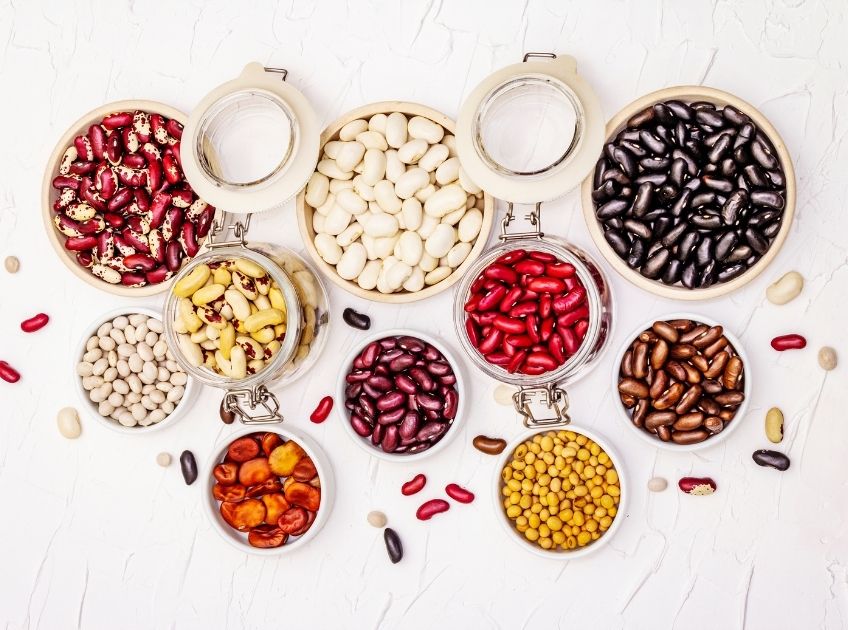
Important: This article is for informational purposes only. Please read our full disclaimer for more details.
Beans are often referred to as nutritional powerhouses — and for good reason. They’re rich in plant-based protein, high in fiber, loaded with essential minerals, and incredibly versatile in everyday cooking. Whether you’re aiming to support heart health, stabilize blood sugar, improve gut function, or simply eat more whole foods, beans can play a major role.
Dietitians consistently highlight beans as a low-cost, nutrient-dense food that can help reduce chronic disease risk. Their blend of protein and fiber keeps you full longer, supports steady energy levels, and contributes to overall digestive health. From soups to salads to snacks, beans offer endless ways to boost nutrition with minimal effort.
The 7 Top Beans Dietitians Recommend for Better Health
1. Black Beans
Black beans are rich in fiber, plant protein, and antioxidants. Their dark color signals the presence of anthocyanins, compounds also found in berries. These antioxidants may support heart health and help reduce oxidative stress. Black beans also have a low glycemic impact, which means they may help control blood sugar levels after meals.
Great for: Burrito bowls, soups, salads, and veggie patties.
2. Chickpeas (Garbanzo Beans)
Chickpeas are a staple in Mediterranean-style eating, known for supporting heart and metabolic health. They contain a combination of soluble fiber and resistant starch that may help improve digestion and enhance gut bacteria diversity. Their protein and fiber content make them excellent for appetite control.
Great for: Hummus, chana masala, roasted chickpea snacks, and salads.
3. Lentils
Lentils cook quickly and are packed with nutrients, including folate, iron, potassium, and polyphenols. Dietitians often recommend lentils for supporting blood pressure, digestive health, and energy levels. Studies suggest that lentil consumption(1) may help lower cholesterol and support steady blood sugar levels.
Great for: Soups, dals, stews, and warm grain bowls.
4. Kidney Beans
Kidney beans are a hearty bean full of fiber and essential minerals. They contain plant compounds that may help support heart health and reduce inflammation. Thanks to their slow-digesting carbs, they may help control appetite and maintain energy throughout the day.
Great for: Chili, salads, curries, and bean-based stews.
5. Navy Beans
Navy beans are among the highest in fiber of all beans, making them excellent for gut health and cholesterol support. Their soluble fiber content may help improve digestion and maintain healthy bowel movements. They’re also a good source of manganese and magnesium.
Great for: Baked beans, white bean soups, dips, and spreads.
6. Soybeans (Including Edamame)
Soybeans are unique because they are one of the few plant foods considered a complete protein, meaning they contain all essential amino acids. Research has explored soy’s potential benefits for heart health and hormonal balance (2). Edamame, the young form of soybeans, is particularly high in protein and fiber.
Great for: Stir-fries, salads, snacks, miso soups, and tofu-based dishes.
7. Pinto Beans
Pinto beans are widely used in South American and Mexican cooking. They offer a balanced mix of protein, fiber, and complex carbohydrates that may support blood sugar control. They also contain antioxidants that may help reduce inflammation.
Great for: Refried beans, burritos, soups, and rice bowls.
Simple Ways to Add More Beans to Your Meals
Beans are not only healthy — they’re incredibly easy to use. Even small additions can make a noticeable difference in your nutrition.
i. Add them to daily meals
- Toss beans into salads, soups, curries, and grain bowls for a quick protein and fiber boost.
ii. Blend them into dips or spreads
- Chickpeas, white beans, and black beans create creamy dips without added fat.
iii. Use beans as a protein replacement
- Swap meat for lentils, chickpeas, or kidney beans in tacos, stews, and wraps.
iv. Snack smart with beans
- Roasted chickpeas, edamame, or seasoned black beans make crunchy, satisfying snacks.
v. Cook once, eat all week
- Prepare a batch of beans and store them to use in multiple meals — a favorite strategy among dietitians.
What Research Says About Beans and Health
Beans are widely studied for their nutritional benefits:
- Fiber for Gut and Heart Health: Soluble fiber helps reduce LDL cholesterol and supports healthy digestion. Fiber also feeds beneficial gut bacteria, contributing to overall gut balance (3).
- Plant Protein and Metabolic Benefits: Beans provide a steady source of protein that may help maintain muscle mass and appetite regulation (4).
- Low Glycemic Impact: Many beans digest slowly, supporting healthy blood sugar levels and reducing energy crashes.
- Rich in Micronutrients: Iron, potassium, folate, and magnesium — all essential for daily function — are abundant in commonly eaten beans.
Because beans combine protein, fiber, and antioxidants, dietitians consider them one of the most complete plant foods available.
Frequently Asked Questions (FAQ’S)
1. Do canned beans offer the same benefits as cooked beans?
A. Yes. Canned beans are nutritious and convenient. Rinsing them helps reduce excess sodium.
2. Can beans cause digestive discomfort?
A. Some people experience gas or bloating when they suddenly increase fiber. Introducing beans gradually and drinking enough water usually helps.
3. Are beans good for weight management?
A. Yes. Beans are high in fiber and protein, which help with satiety and stable blood sugar levels — factors linked to healthy weight maintenance.
Beans are one of the most nutritious, affordable, and versatile foods you can add to your diet. Whether you choose black beans, lentils, chickpeas, or soybeans, each offers a unique blend of nutrients that support heart health, digestion, and long-term wellness. By incorporating beans into everyday meals — even in small amounts — you can enjoy sustained energy, better gut health, and improved nutritional balance.















